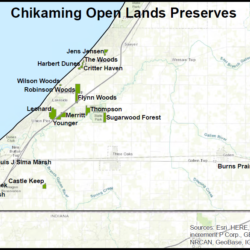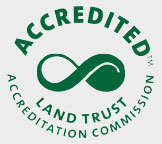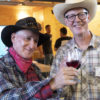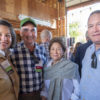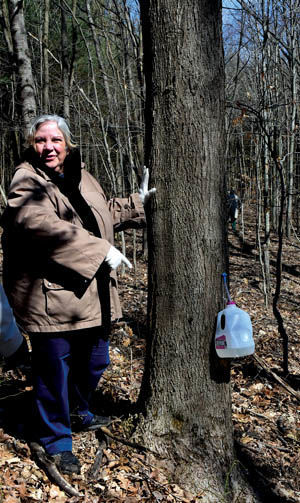
Boiling Down the Sweet Taste of Spring at Covenant Farm
Posted on March 20, 2019
Find Article HERE.
SAWYER — Making maple syrup the old-fashioned way is a sure sign that spring is near at Covenant Farm near Sawyer.
Chikaming Open Lands sponsored a Saturday, March 16, outing to the cooperatively owned property to see the step-by-step process of converting maple tree sap into a sweet treat up-close and personal (with plenty of hiking through the late-winter mud accompanied by resident dog “Buddy”).
“Native peoples have been making maple syrup for millennium. It’s not a new process, we just have technology that makes it a little easier to do it,” said Daniel Dale, one of the founders of the 70-acre farm owned by members of seven families. He led the tour on a a beautiful, if a bit chilly, day.
The property includes a creek, frontage on the Galien River and an oxbow pond that was part of the Galien until it became separated in the 1920s when the river changed course.
The “sugar bush” area (a group of sugar maples) where Dale said sap is being collected via taps and plastic milk jugs is located on a slope with southern exposure near the scenic oxbow pond that helps the sap flow more quickly once the trees are warmed by the sun. He said the best time to tap into a tree is this time of year when its gets below freezing at night and warms above that level during the day.
Dale said a tap doesn’t remove enough sap to hurt the tree, but it can add up pretty quickly if you’re looking to make syrup.
And you’ll need a lot.
To get the five gallons of maple syrup that Covenant Farm plans to use, about 50 gallons of sap must be collected.
As of midday on March 16, about 40 gallons had already been collected. And the jugs were about a third full again early in the afternoon.
All of that sap is poured into a large blue bucket attached to a Kubota tractor that hauls in back to the “sugar shack” where most of the lengthy process of boiling the liquid down to syrup takes place (a process that includes straining out sediments via “one of my old T-shirts”).
Dale said the wood-fired warming pan and three evaporators are tended until they reach the point where they are poured in a pot two gallons at a time to go inside the farmhouse and be finished atop the kitchen stove with the help of a candy thermometer.
“You want it to be 219 degrees — that gives you the maximum sugar before it starts to crystalize,” he noted.
Prior to setting out for the sugar bush area, Dale talked about the history of Covenant Farm in front of a property map painted on the side of a garage.
“We got the place in 1978, and we were all students (at the University of Chicago) or living in Hyde Park and we wanted a place to get out of the city,” he said.
Dale said the main farm house was burned down and gutted (it took 15 years to restore it), the property had been abandoned for four years and the fields were played out.
“We’ve always done gardening and planted some orchards,” he said.
For the first two years a small cinder block outbuilding was the only useable structure. A restored chicken coop was eventually converted into the main building with a dining area (French toast and fresh maple syrup were served inside on March 16).
Carol Baker said the syrup was “delicious” while Janet Blake said it reminds her of what her dad used to do up in Maine.
In 1985 the process of planting trees (a mixture of white pines and varieties of native hardwoods such as oaks, maples cherry, walnut and tulip poplars) was begun on the 40 acres of old farm fields.
Juanita Burris, another original member of the Covenant Farm cooperate, said the Department of Agriculture helped with the plantings when it became apparent the land could no longer support growing corn or soybeans.
Dale said the pine trees help the hardwoods grow straighter and higher, speeding the creation of a mature forest canopy filled with tall, straight trees at the 60-foot level.
As time goes on Dale said the pines are slowly being thinned to be used to make furniture or to build buildings such as the nearly completed Meadow House dormitory that hikers passed on the way to the sugar bush grove.
The property also is home to other structures including a 100-year-old Tower Hill Camp cabin that was moved there several years ago when it was slated to be demolished.
Dale said Covenant Farm is one of the original properties in this area to arrange a conservation easement through Chikaming Open Lands to protect its natural state in perpetuity (COL is now involved in 35 easements).
“What we did was work with COL to ensure that this property will always be woodlands with the goal that we will restore it to being an indigenous hardwood forest,” he said, adding that it will take about 80 years to achieve that goal.
Dale addd that tow of the farm’s neighbors also have signed up for conservation easements.
“We want to make sure that the greenway along the Galien River is as complete as possible … and that we can be a part of restoring the Galien,” he said.

